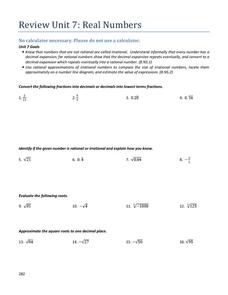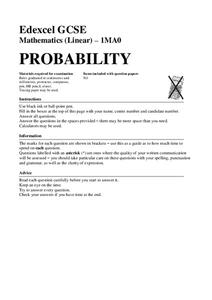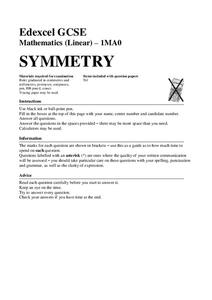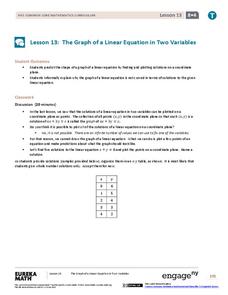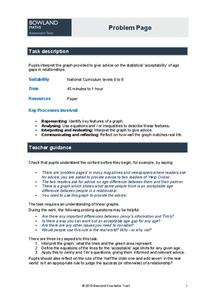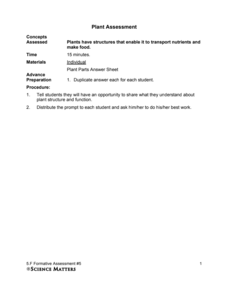College Board
2000 AP® Calculus AB Free-Response Questions
Gain an upper hand in preparation for the exam. Teachers and pupils use six released questions to gain an understanding of the AP® Calculus exam. By answering the questions, scholars see how different concept of the course show up on the...
Curated OER
ESL: Match Questions and Answers
In this ESL question/answer activity, students match a set of 10 questions with their correct answers. Students may click on an "answer" button for immediate feedback.
College Board
2013 AP® Biology Free-Response Questions
AP® free-response questions are often challenging for scholars. Give them practice writing free-response questions using former questions from the AP® Biology exam on topics such as genetic mutations, cellular respiration, evolution, and...
Charleston School District
Review Unit 7: Real Numbers
Provide pupils with problems to check their understanding of the concepts within the unit. The seven-part series of lessons covers concepts related to irrational numbers. Learners convert between fractions and decimals, estimate the...
Curated OER
Tag Questions with "Be"
A quickie-clickie, online interactive matching exercise has learners choose the correct tag to turn each of 10 declarative sentences into questions. Answers are available at the click of a button, and learners don't need to even attempt...
Curated OER
Tag Questions - With Assorted Verbs
If they are intrinsically motivated, your learners complete a 10-question matching online interactive quiz. They match sentences with the tag questions that go with them. They don't need to try on their own before the answers are...
EngageNY
Tables of Equivalent Ratios
Don't table the discussion on equivalent ratios — do it now! Scholars create tables of equivalent ratios to represent contextual problems. Pupils go on to use the tables to answer questions within the context. The lesson is ninth in a...
EngageNY
Percent
Extend percent understandings to include percents less than one and greater than 100. A great lesson has pupils build upon their knowledge of percents from sixth grade. They convert between fractions, decimals, and percents that are less...
Mathed Up!
Probability
How likely is it to draw a blue marble? Pupils find the likelihood of events and connect that to the probability of the event. They find the probabilities of simple events and show their probabilities on a scale.
Mathed Up!
Symmetry
Eleven problems provide pupils the opportunity to find the lines of symmetry or identify rotational symmetry. Scholars alter designs to make them symmetrical, learn to recognize signs that are symmetrical, and identify the type of...
Balanced Assessment
Lotto
You can't win if you don't play! Find out how to increase your chances of winning the lottery. Scholars analyze a state lottery system for the probability of winning. They also consider different combinations of numbers and how they...
EngageNY
The Graph of a Linear Equation in Two Variables
Add more points on the graph ... and it still remains a line! The 13th installment in a series of 33 leads the class to the understanding that the graph of linear equation is a line. Pupils find several solutions to a two-variable linear...
Mathed Up!
2D and 3D Shapes
What a great assessment to give young mathematicians in order to test their knowledge on two- and three-dimensional shapes. Learners name various shapes, identify the number of edges, faces, and vertices, match an unfolded version of a...
CCSS Math Activities
Smarter Balanced Sample Items: 8th Grade Math – Target C
Target C from the Smarter Balanced assessment for eighth grade is understanding the connections between proportional relationships, lines, and linear equations. A slide show includes items about graphing proportional relationships and...
Charleston School District
Pre-Test Unit 7: Real Numbers
Don't be irrational! Use this pre-test to assess your classes' ability to work with all types of real numbers. The lesson asks learners to estimate value, evaluate roots, and order numbers. This begins a series of lessons on the real...
CCSS Math Activities
Smarter Balanced Sample Items: High School Math – Target N
Let the resource be part of your lesson sequence. Learners work through eight questions given as part of a PowerPoint presentation in the Claim 1 Item Slide Show series. They must come up with functions for contextual situations and...
Mt. San Antonio Collage
Quiz 1: Functions, Domain and Range
Take the work out of worksheets and use these problems and worked-out answer key as a resource. The problems reinforce skills in domain and range, identifying graphs, and even and odd functions.
Balanced Assessment
Stick Patterns
Sticks and stones may break my bones, but these sticks will make me smarter. Pupils examine arrays of sticks to determine the next array in a pattern. They use the number of sticks added to each previous array to determine a recursive...
EngageNY
Displaying a Data Distribution
Pupils analyze a display of data and review dot plots to make general observations about the highest, lowest, common, and the center of the data. To finish, learners match dot plots to scenarios.
Illustrative Mathematics
Sharing Markers
Let your first graders translate these word problems into subtraction sentences. Some of the equations involve finding the answer after Char gives some of her markers away, while others require finding the amount of markers Char started...
Curated OER
When, Why, What, How, Who?
In this matching answers with their questions worksheet, students read when, why, what, how, who, and do you questions and match their appropriate answers. Students match 8 answers and click the answer button to check.
Illustrative Mathematics
Graphs of Quadratic Functions
Instead of the typical quadratic questioning, explore the function and look at the three different ways a parabola can be written. The main task is when given several clues, young mathematicians must write an equation that matches the...
Bowland
Problem Page
Future mathematicians use a given graph to answer a question about age differences in relationships. Along the way, they must find the equation and inequality of given graphs.
Science Matters
Formative Assessment #5: Plant
Information from formative assessments is vital to plan for instruction. The 17th in a 21-part series of lessons on plant and animal systems quizzes pupils on their knowledge of the function of plant parts. Given a part of the plant,...



